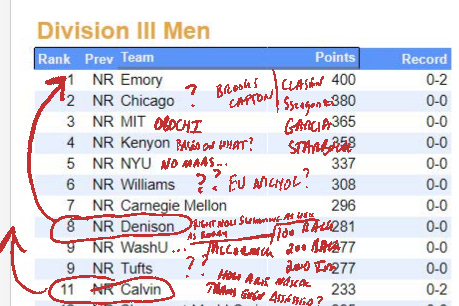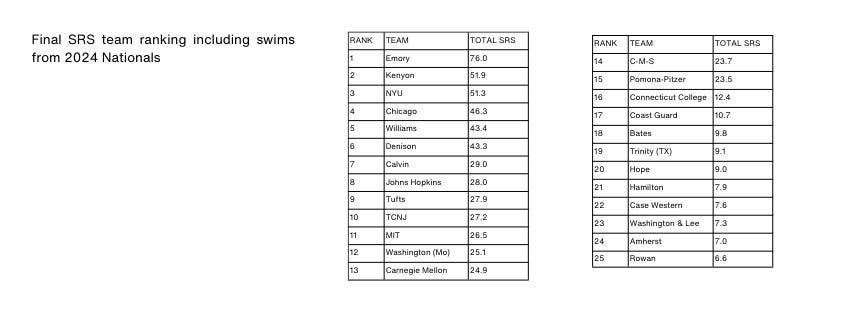Based on what?
We would just appreciate a little more transparency from the CSCAA. Anyway, this post gets good towards the end, so feel free to scroll down.
TLDR
First, we complain.
Second, we get pedantic about ranking teams based on last season.
Third, we look at something a little more interesting.
Well, OK. Let’s get into it.
It seems silly to be ranking teams right now.
But, in a way, we are grateful to the CSCAA for giving us something to react against.
We have no idea how the group behind the CSCAA Division III Men’s poll came up with the ranking above. Based on this season alone, the Denison Men are swimming as well as anyone (the SwimCloud meet simulator even has them in a dead tie with Emory in a dual meet format). Yet, they are ranked 8th, behind teams like Kenyon and Williams, who have yet to post any measurable or meaningful individual swims.
We believe the Men’s teams from Kenyon and Williams will be excellent as the season progresses. But they haven’t achieved anything yet. So, how are they ranked ahead of a team that’s already swimming, and swimming well?
An SRS team ranking, based on the entire 2023-24 season
Let’s try something a little more transparent and comprehensible. We can review how the teams were ranked based on SRS at the end of last season. This time, we’ll also factor in swims from the 2024 Nationals.
There aren’t many surprises, especially near the top of the ranking. We can stress-test these results because they’re retrospective, reflecting how teams performed last year. Since Emory and Kenyon finished 1-2 at Nationals, and the top five teams were all in the top five at Nationals (though not in the exact same order), it’s almost a boring confirmation of what we already expect.
It is a little boring, we admit—that’s the main downside. But the upside is:
We’re using a transparent and objective methodology for the rankings.
There’s no guessing involved about the data we’re using. These rankings are based on the fastest swims from athletes during the 2023-24 season, including Nationals.
We’re applying this same methodology consistently to all teams, without giving anyone a pass based on past performance.
Who lost how much?
It’s NCAA swimming and diving—athletes graduate. However, the impact of graduation varies across the top teams. Below is a breakdown of the top teams, ranked by how many SRS points they lost due to last season’s graduating class.
Chicago, -30.8 SRS Point
Chicago tops the list. They lost the greatest swimmer in the history of their program, Garrett Clasen. If you disagree with that designation, your best alternative candidate would be Jesse Ssengonzi (2024 National Champion, 100 Fly). Well, they lost him too. They lost consistent Nationals finalist Kyle Garcia, breast-stroke threat Jason Starbuck, and a solid contributor in Hudson Tritter.
The CSCAA poll ranks Chicago second going into this season. Maybe that will prove to be justified. But right now, moving Chicago up in the rankings requires a solid explanation of how they’re expected to recover from these losses and improve on last year’s performance. And since we’re talking about the CSCAA Men’s Division III poll, we’re not holding our breath for an explanation.
NYU, -27.5 SRS Points
NYU is a fairly young team, and they graduated fewer athletes than many of the other teams on this list. And that doesn’t really matter because they lost Derek Maas, whose departure (in terms of SRS) is worth more than the loss suffered by any other team except Chicago and Emory.
Emory, -26.7 SRS Points
Emory, of course, remains the team to beat. However, they lost several key contributors, including some of the most valuable swimmers in the division—Jake Meyer, Nick Goudie, and Ryan Soh come to mind.
Kenyon, -24.3 SRS Points
Kenyon amusingly sent only ten swimmers to Nationals last year to compete in Men’s events (plus Israel Zavaleta), and still managed to finish second to Emory. Of those ten, five are now gone. This includes the unusually valuable relay-asset Daniel Brooks (who will swim his 5th year for Chicago), hyper-versatile athletes like Max Nonnenmacher and Noah Hargrove, a beloved and at times heroic1 former national champion (100 Fly) in Marko Krtinic, and one of the better swimmers in Kenyon’s storied history, Yurii Kosian.2
Williams, -13.5 SRS Points
Williams remains a fairly young team. They lost important contributors in Alex Atherton, Ev Nichol (most interesting IG feed in D3), and Jacob Grover. These were some of the best swimmers in the division. But the team they leave behind is balanced and looks solid heading into this season. We will know more when they, you know, start actually swimming in meets.
Denison, -6.0 SRS Points
Wow. Denison appears to be in great shape. They lost major point scorers Luke Landis and Sam Myaard, along with solid contributor Nick Settembrine—but that’s it. This is a young, talented team. They finished 6th at Nationals last season, and every team ahead of them lost far more SRS value than the Big Red.
Calvin, -12.9 SRS Points
Calvin lost some significant talent—Julien Camy, Eric Chimes, and Forrest Peterson stand out—but they are swimming well early in the season. They still have another year of David Bajwa, who we believe is one of the most underrated swimmers in Division III.
Johns Hopkins, -12.6 SRS Points
We are going to miss Kellen Roddy, but you don’t have to. He has a great IG called Distance Revolution. Worth following. Also gone are serious contributors Brandon Stride, Ike Shirakata, Justin Limberg, and Reef Ide.
Tufts, -4.5 SRS Points
The Jumbos lost Peter LaBarge and Will Stearns, which amounts to a measurable loss. However, this is largely a young team returning mostly intact.
TCNJ, -12.3 SRS Points
The Lions lost two significant SRS-level contributors, including Lukas Blach, a reliable distance freestyler, and James McChesney. McChesney’s departure is the single biggest loss for any team outside of Derek Maas. He was one of the best swimmers in the division over the past few years, with SRS-worthy swims in eight different events last season. A two-time reigning national champion in the 200 Free and the Division III record holder in that event, McChesney always seemed to be enjoying himself. We are really going to miss him. That said, TCNJ still returns a solid number of Nationals-level swimmers and will likely remain a significant factor in the seasons to come.
From ‘Those 400 Medley Relays’, March 22, 2024
The beloved Marko Krtinic’s Senior season is drawing to a close with a number of swims that are best classified as heroic, if not particularly fast. At NCACs, to avoid a DQ in a tight meet, he swam through excruciating cramps in the 200 Fly and had to be dragged from the pool by five teammates and coaches (he’s a big dude) and deposited on the deck where he writhed in pain for several minutes.
Yurii Kosian’s impressive record at Nationals:
2022: 10th place, 200 Free; 4th place, 100 Back; 2nd place, 200 Back
2023: 5th place, 200 Free; 9th place, 100 Back; 5th place, 200 Back
2024: 5th place, 100 Back; 2nd place, 200 Back






This is a fundamental misunderstanding of what these rankings are for. Let me illustrate:
Pre and early season rankings are inherently based in historical bias. Yes, it’s boring and predictable that the top five teams in the current polls were the top five teams from nationals this past year but sustained success is boring and predictable. If you’re asking for more diversity in rankings for the early season simply to have different teams in higher spots, then it fails to serve as an accurate snapshot of how good teams actually are here. Why do teams like Alabama and Ohio State in CFB and Duke in CBB always start highly ranked in their preseason polls? Because they have a history of sustained and continued excellence year after year. If you’ve noticed, Kenyon has been good forever and Emory, Denison, and Chicago have been good for a while at this point. They recruit well (yes, recruiting matters a lot in rankings, especially in a sport that is tied to a regulated clock for quality of athlete) and have good coaching with proper facilities. Do you want to know why Kenyon is ranked ahead of Denison? Because we are operating on the assumption that on an even field of suiting and training schedules, Kenyon will be better unless we are provided strong evidence otherwise (i.e. Kenyon performs badly in an important later season dual or midseason meet). If that’s an issue, then the entire pre and early season polling system is your issue.
This is not a complicated methodology like KenPom or FPI that regulates and informs CBB & CFB polls respectively where every aspect of data has a statistical rate that can sort teams in absence of direct competition in early and preseason polls. Swimming is an inherently objective thing to rank due to the nature of the sport. There is no three point variance or coaching decisions or schemes that can provide match up advantages and deliver early season wins over similar quality competition that can reasonably inflate poll positioning. The teams that swim faster and have swum faster are better. We have watches and clocks that inform us of how good at the sport someone is. The best teams are the teams who have their season best times be better than the swimmers of other teams. Those season/lifetime bests are what constitute the quality of a swim team. And for the purposes of pre and early season rankings, the most valuable thing we have for rankings is the previous PR’s and SR’s of the swimmers of the team.
Notably, this almost seems as a call for teams to utilize more early season speed and more suited dual meets in the early part of the season. To what end? What is stopping a marginal top 30 team from early suiting to boost their potential ranking only to see their end season SRS reflect the true quality of the team? We have to award a team with a high early season ranking due to a foolhardy training plan and then be surprised when their final ranking will fall off of a cliff due to other teams swimming better for the true suited meets? If that’s the case, then the ranking system loses all authority and meaning because now we’re basing overall team rankings as glorified team of the week awards. The authority of the polls is lessened if teams are jumping and falling dozens of spots on a monthly basis. Consistency is always key in any analysis, whether in intrinsic value or statistically based. Why would anyone pay attention to polls if this was the format? The only thing that this polling style would do is tell me how good this team is in October. Rankings are meant to be an all encompassing evaluation of a team that is based on one part history, one part current performance, and one part projection. Otherwise, we’re operating on a “prisoner of the moment” ranking system that fluctuates too wildly for anyone to give credence to it.